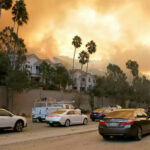Energy News Beat
California’s SB 222, which would have allowed lawsuits against oil and gas companies over natural disasters, officially died in committee.
California legislation that would have permitted the state FAIR plan, individuals, and insurers to sue oil and gas companies over natural disasters officially failed to advance last evening in the California Senate Judiciary Committee. [emphasis, links added]
SB 222, which was sponsored by San Francisco State Sen. Scott Wiener and the Rockefeller-backed Center for Climate Integrity, only notched 5 of the 7 committee votes needed to proceed amid stiff bipartisan opposition.
The legislation has been a flashpoint in the ongoing California homeowners insurance debate as climate lawfare activists looked to capitalize on the recent string of devastating wildfires across the state.
Democrats Vote Against SB 222 Due to Cost and Feasibility Concerns
Sen. Angelique Ashby and Sen. Anna Caballero, both Democrats, voted against the bill outright while fellow Democrats Chairman Tom Umberg and Sen. Maria Durazo abstained, arguing they were unconvinced the legislation would help stabilize California’s soaring home insurance premiums.
In a statement to the Associated Press before the hearing, Sen. Caballero pointed out that she supports strong environmental policy – but argued that SB 222 does not hit the mark:
“If this was going to actually result in building homes in the fire zones faster, better and with more efficiency, I would probably support it… But from my view, this is more about lawyers. This is about litigation.”
During the hearing, the Central Valley Democrat and former trial attorney echoed her earlier comments that the legislation was “more about lawyers” than meaningful climate action, warning that it could lead to extended litigation while doing little to address California’s housing or insurance affordability crises:
“What looks like a simple solution is not always a simple solution. I want us to create opportunities for the workers who are here today to continue working, to be able to earn livable wages, and for us to solve our climate issues in a way that includes carbon capture, hydrogen, and biogas. […]
“These are the kinds of jobs that will create livable wages and help us reach our climate goals. I think we’re all trying to reach the same goal. I just don’t think we’re going to get there through this litigation.” [Emphasis Added]
Sen. Ashby, a former attorney representing Sacramento, also opposed the measure. Sen. Ashby cautioned that the bill would “absolutely drive up the cost of gas” and questioned whether relying on private litigation was an effective tool:
“And I think in the end, this bill—at least for me—is too much about a private right of action and a litigation strategy. It’s too much money spent on lawyers and courts and not enough on people. I know it’s intended to be a form of accountability, and we’re sitting in the Judiciary Committee. I went to law school. I get it. That’s what the legal system is supposed to do—accountability.
“But sometimes that mechanism of accountability can get turned upside down. It costs so much that it becomes part of the problem. I truly believe this bill would drive us to that space.” [Emphasis Added]
Several labor unions also played a crucial role in opposing SB 222.
A wide swath of construction and industry union representatives spoke out against the bill, including the Boilermakers, Ironworkers, and the California State Council of Laborers.
Keith Dunn of the State Building and Construction Trades Council warned the bill could cost jobs and destabilize industries already navigating California’s complex regulatory climate:
“When aspirational legislation such as SB 222 is confronted with economic reality, it does nothing but increase the cost for the very people you claim to protect. For the men and women of the building trades, the increased costs of SB 222 will result in lost jobs and economic instability.”
Rockefeller Activists Lash Out At Democrats Following Bill’s Failure
While SB 222 could technically be brought back up for consideration, its prospects appear dim.
The Rockefeller-backed Center for Climate Integrity, one of the primary sponsors of the bill, lashed out at Democratic members of the Judiciary Committee on the social media platform Bluesky after the bill failed to advance.
California could have set a nationwide example for how to make Big Oil pay for its role in the insurance crisis and help protect residents from an uninsurable future.
Instead, some lawmakers decided to shield Big Oil from accountability and deprive citizens of tools to recover devastating losses.
— Center for Climate Integrity (@climateintegrity.bsky.social) April 9, 2025 at 10:03 AM
California Environmental Voters, a political group partnering with CCI to promote the legislation, condemned Democratic abstentions as betrayals, despite the experienced legislators’ concerns about affordability and the legal structure of the bill.
The bill’s failure is the latest in a string of stinging defeats for climate lawfare activists, as frivolous Rockefeller-backed climate lawsuits have been dismissed in various jurisdictions across the country in recent months.
Read rest at EID Climate
The post California Bill That Lets Anyone Sue Oil Companies Over Natural Disasters Is Dead appeared first on Energy News Beat.









